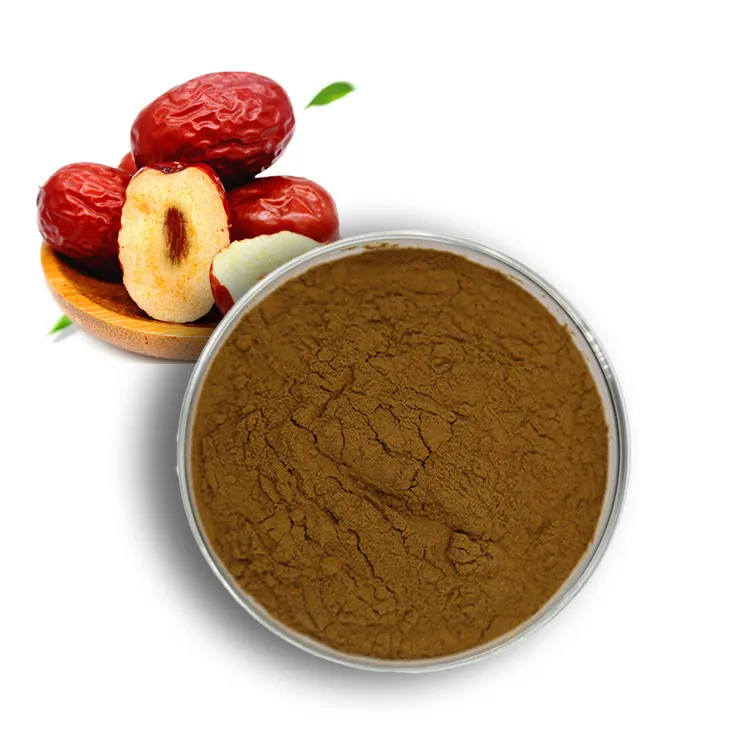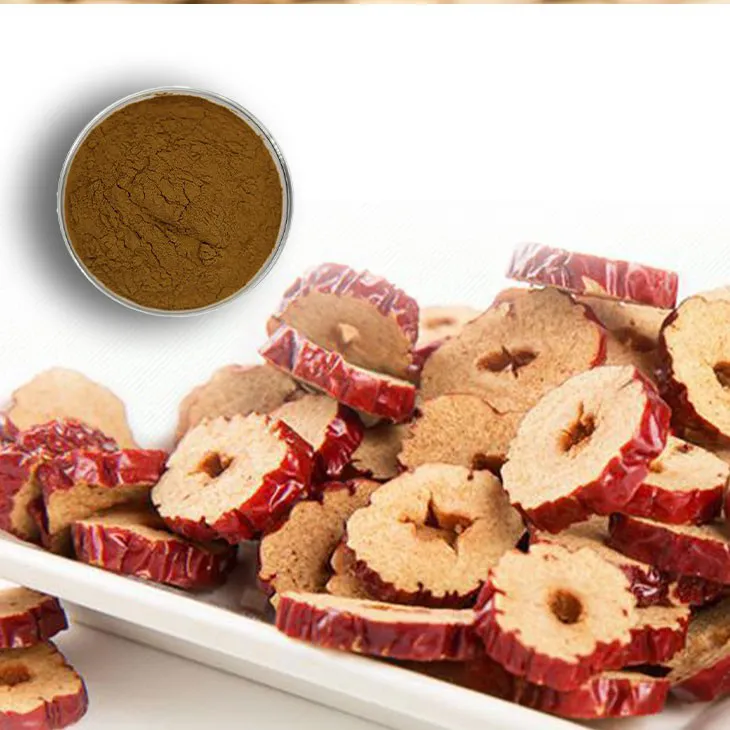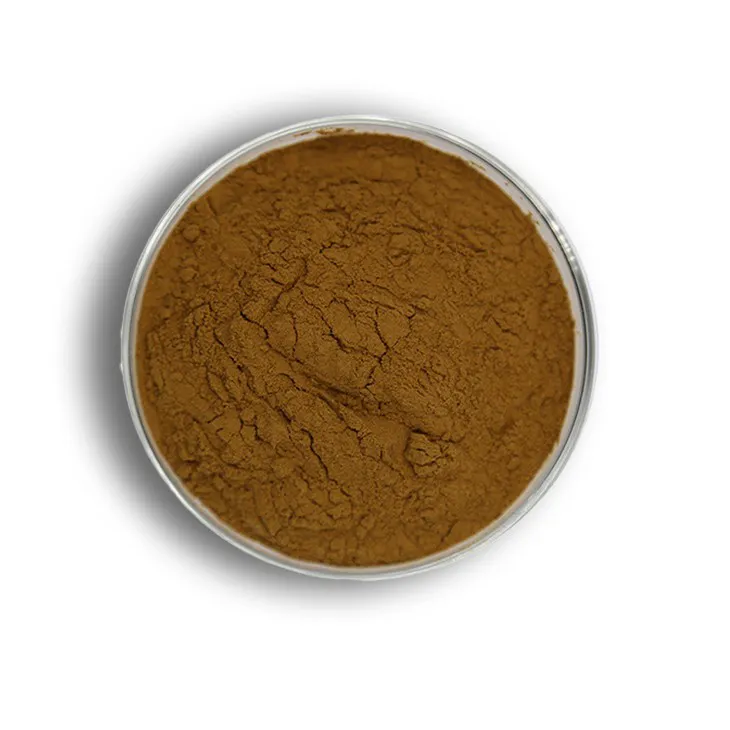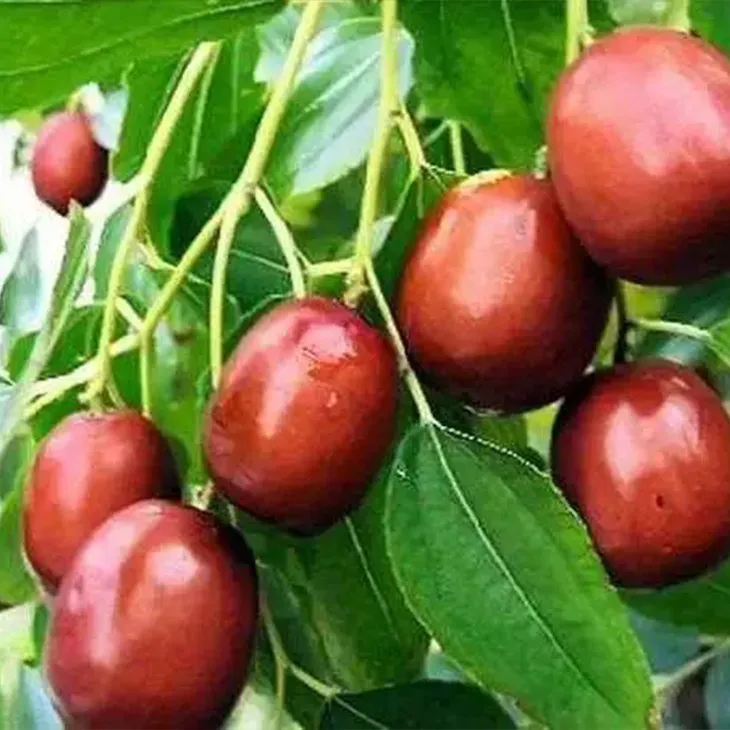- 0086-571-85302990
- sales@greenskybio.com
Jujube Extract: Uses, Advantages and Manufacturing Processes
2024-11-13

I. Introduction
Jujube Extract has been gaining increasing attention in recent years due to its diverse applications and numerous benefits. Derived from the jujube fruit, which has a long history of use in traditional medicine and cuisine in many cultures, the extract contains a rich variety of bioactive compounds. This article will explore the uses, advantages, and manufacturing processes of Jujube Extract in detail.

II. Applications of Jujube Extract
1. Pharmaceutical Industry
In the pharmaceutical industry, jujube extract plays a significant role. It is often incorporated as an ingredient in drugs or herbal remedies because of its multiple pharmacological effects.
For instance, it has been studied for its potential anti - inflammatory properties. Inflammation is a key factor in many diseases, and substances with anti - inflammatory capabilities can be valuable in treating or preventing these conditions. Jujube extract may also have immunomodulatory effects, which means it can help regulate the immune system. This can be beneficial in cases where the immune system is overactive, such as in autoimmune diseases, or underactive, like in immunocompromised individuals.
2. Food and Beverage Sector
The food and beverage sector is another area where jujube extract finds wide application. It is used to develop functional foods that offer additional health benefits beyond basic nutrition.
One popular example is jujube - flavored teas. These teas are not only enjoyable to drink but also possess soothing and health - promoting properties. The extract can add a unique flavor and aroma to the tea, while also providing potential health benefits such as antioxidant protection. Jujube extract can also be added to other beverages like juices, smoothies, and even alcoholic drinks in some cases, to enhance their nutritional value and flavor profile.
In the food industry, it can be incorporated into products like energy bars, cereals, and baked goods. For example, in energy bars, it can provide a natural source of energy along with other nutrients. In cereals, it can add a new flavor dimension and contribute to the overall health - promoting properties of the product.

III. Advantages of Jujube Extract
1. Rich in Antioxidants
One of the major advantages of jujube extract is that it is a rich source of antioxidants. Antioxidants are substances that can scavenge free radicals in the body. Free radicals are highly reactive molecules that can cause cell damage through a process called oxidative stress.
By neutralizing free radicals, jujube extract helps protect cells from damage. This can have a wide range of benefits, including reducing the risk of chronic diseases such as heart disease, cancer, and neurodegenerative diseases. Antioxidants in the extract can also contribute to maintaining healthy skin by preventing premature aging caused by free radical damage.
2. Mild Sedative Effect
Jujube extract has a mild sedative effect, which is a valuable property. In modern society, many people suffer from sleep problems, such as insomnia or difficulty falling asleep.
The sedative effect of the extract can help relax the body and mind, making it easier for people to fall asleep and improve the quality of their sleep. It can be a natural alternative to synthetic sleep aids, which may have potential side effects. Additionally, the mild sedative effect can also be beneficial for reducing stress and anxiety levels during the day.
3. Sustainability
Another advantage of jujube extract is its sustainability. Jujubes are widely cultivated in many parts of the world, which means there is a relatively large and stable supply source.
Compared to some rare or exotic plants used for extraction, the cultivation of jujubes requires less specialized conditions and resources. This makes jujube extract a more sustainable option for various applications. The wide availability of jujubes also helps in keeping the cost of production relatively low, which can be beneficial for both manufacturers and consumers.

IV. Manufacturing Processes of Jujube Extract
1. Collection of Fresh Jujubes
The manufacturing of jujube extract begins with the collection of fresh jujubes. This is a crucial step as the quality of the raw material directly affects the quality of the final extract.
Jujubes are typically harvested when they reach the appropriate maturity level. The harvesting time may vary depending on the variety of jujube and the intended use of the extract. Farmers need to ensure that the jujubes are picked carefully to avoid damage, as damaged fruits may introduce contaminants or affect the extraction process.
2. Quality Inspection
After collection, the fresh jujubes are subjected to quality inspection. This step is essential to ensure that only high - quality fruits are used for extraction.
The inspection may include checking for physical damage, signs of disease or pest infestation, and proper maturity. Jujubes that do not meet the quality standards are removed from the batch. This helps in maintaining the consistency and purity of the extract.
3. Extraction Methods
Once the jujubes pass the quality inspection, the extraction process begins. There are several extraction methods that can be used to isolate the active compounds from the jujubes.
- Maceration: This is a traditional extraction method. In maceration, the jujubes are soaked in a solvent, such as ethanol or water, for a period of time. The solvent helps to dissolve the active compounds present in the jujubes. During this process, the jujubes are usually crushed or chopped to increase the surface area for better extraction. After the soaking period, the liquid containing the dissolved compounds is separated from the solid residue.
- Percolation: Percolation is another extraction method. In this method, the solvent is continuously passed through a bed of crushed jujubes. The solvent slowly percolates through the jujube material, extracting the active compounds as it goes. This method can be more efficient than maceration in some cases as it allows for a continuous extraction process and can potentially extract a higher proportion of the active compounds.
4. Refinement of the Extract
After the extraction, the resulting jujube extract is usually not pure enough for direct use. Therefore, it needs to be refined.
One common refinement method is distillation. Distillation involves heating the extract to vaporize the solvent and other volatile components. The vapor is then condensed back into a liquid, leaving behind the more concentrated and purified extract. Another refinement technique is chromatography. Chromatography can be used to separate different components of the extract based on their chemical properties. This helps in removing impurities and obtaining a more pure and concentrated jujube extract.

V. Conclusion
In conclusion, jujube extract has a wide range of applications in the pharmaceutical and food and beverage industries. Its advantages, such as being rich in antioxidants, having a mild sedative effect, and being a sustainable ingredient, make it an attractive option for various uses. The manufacturing process, from the collection of fresh jujubes to the refinement of the extract, is designed to ensure the quality and purity of the final product. As research on jujube extract continues, it is likely that more applications and benefits will be discovered in the future.
FAQ:
What are the main applications of jujube extract?
Jujube extract is mainly applied in the pharmaceutical industry as an ingredient in drugs or herbal remedies due to its pharmacological effects. In the food and beverage sector, it is used to produce functional foods. For instance, jujube - flavored teas are popular for their soothing and health - promoting features.
What are the benefits of jujube extract?
Jujube extract has several benefits. It is a rich source of antioxidants, which can scavenge free radicals in the body and prevent cell damage. It also has a mild sedative effect, which is helpful for people with sleep problems. Moreover, it is a sustainable ingredient as jujubes are widely cultivated.
How is jujube extract manufactured?
The manufacturing of jujube extract begins with the collection of fresh jujubes followed by quality inspection. The extraction process may use methods like maceration, percolation, etc. to isolate the active compounds. Then, the extract is refined through techniques such as distillation or chromatography to remove impurities and obtain a pure and concentrated jujube extract.
Is jujube extract only used in the food and pharmaceutical industries?
While jujube extract is commonly used in the food and pharmaceutical industries, it may also have potential applications in other sectors. However, currently, these two are the main sectors where it is widely utilized.
Can jujube extract replace sleeping pills?
Jujube extract has a mild sedative effect, but it cannot directly replace sleeping pills. It may be used as a natural supplement to help improve sleep quality, but for serious sleep disorders, medical advice and proper treatment with approved medications are still necessary.
Related literature
- The Pharmacological Properties of Jujube Extract"
- "Manufacturing Processes of Plant Extracts: A Case of Jujube"
- "Applications of Jujube Extract in Functional Foods"
- ▶ Hesperidin
- ▶ citrus bioflavonoids
- ▶ plant extract
- ▶ lycopene
- ▶ Diosmin
- ▶ Grape seed extract
- ▶ Sea buckthorn Juice Powder
- ▶ Beetroot powder
- ▶ Hops Extract
- ▶ Artichoke Extract
- ▶ Reishi mushroom extract
- ▶ Astaxanthin
- ▶ Green Tea Extract
- ▶ Curcumin Extract
- ▶ Horse Chestnut Extract
- ▶ Other Problems
- ▶ Boswellia Serrata Extract
- ▶ Resveratrol Extract
- ▶ Marigold Extract
- ▶ Grape Leaf Extract
- ▶ blog3
-
High purity olive leaf extract
2024-11-13
-
Lavender oil extraction method
2024-11-13
-
100% organic virgin sea buckthorn fruit oil
2024-11-13
-
Lotus leaf extract powder factory in China
2024-11-13
-
China aged garlic extract supplier
2024-11-13
-
Deer antler extract powder manufacturer
2024-11-13
-
Saw palmetto extract vs whole herb
2024-11-13
-
White Peony Extract
2024-11-13
-
Dandelion Root Extract
2024-11-13
-
Acerola Juice Powder
2024-11-13
-
Camu Camu Extract
2024-11-13
-
Purple Sweet Potato Extract
2024-11-13
-
Longan Extract
2024-11-13
-
Genistein
2024-11-13
-
Bitter Melon Extract
2024-11-13
-
Troxerutin
2024-11-13
-
Dan Shen Root Extract/Salvia Root Extract
2024-11-13





















